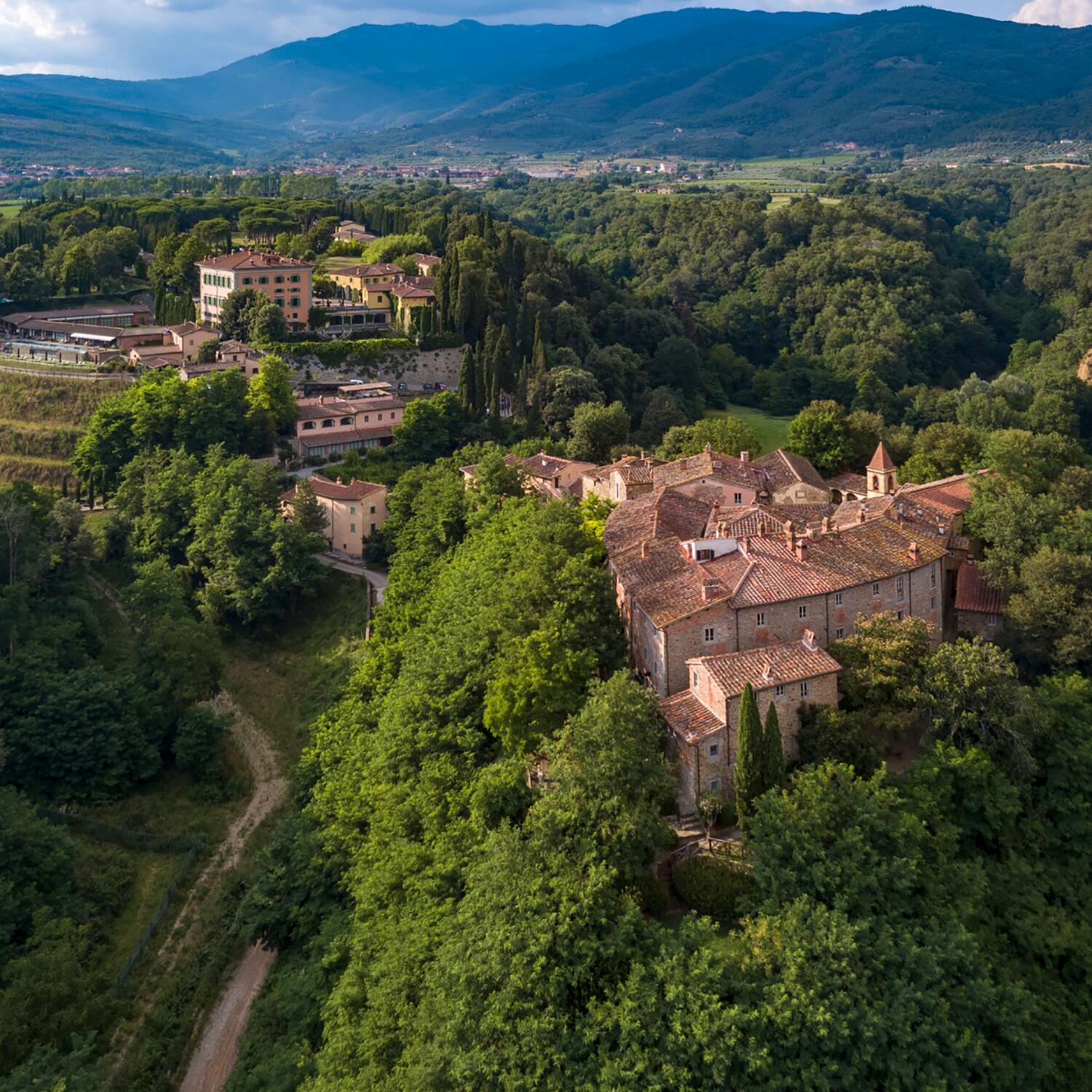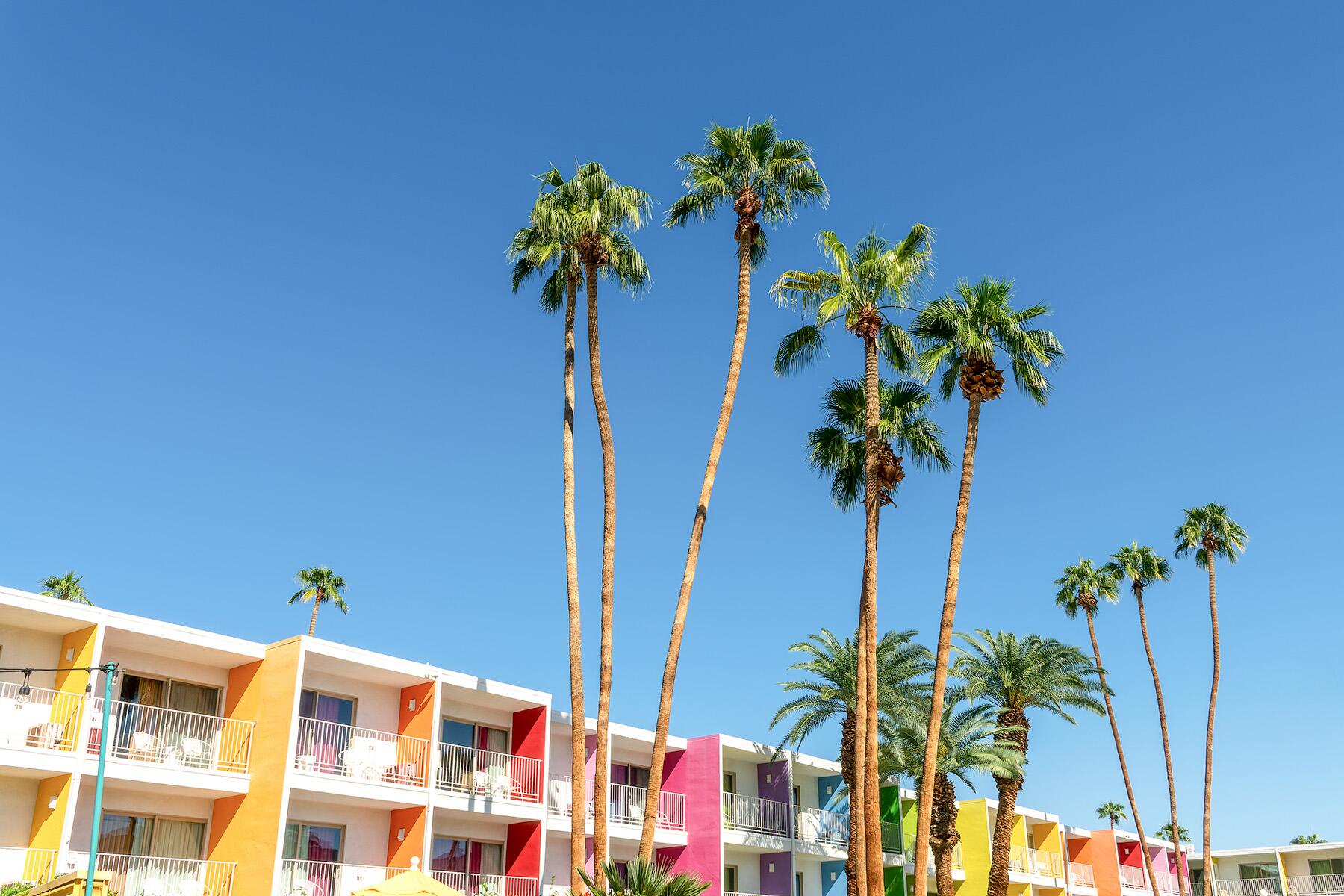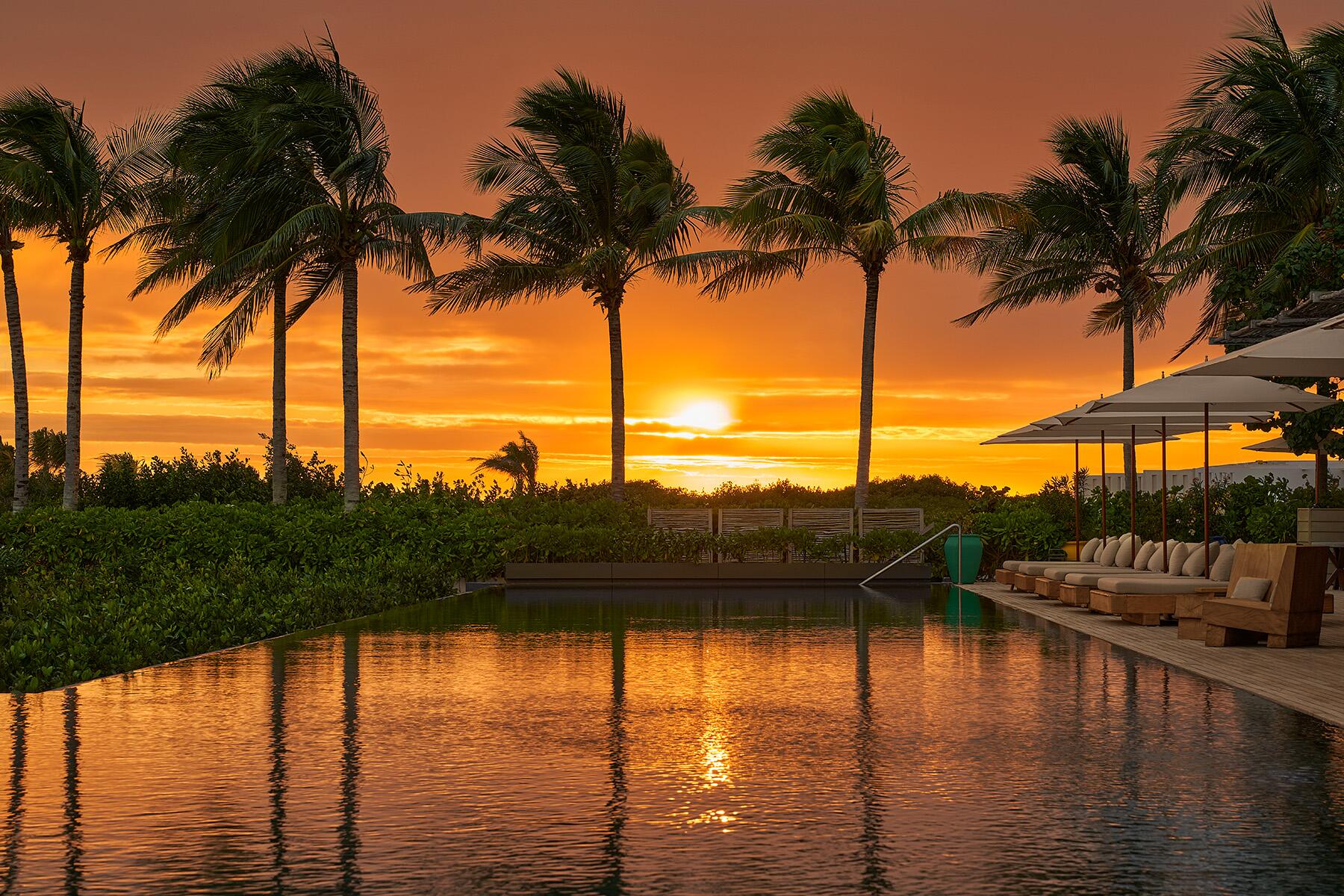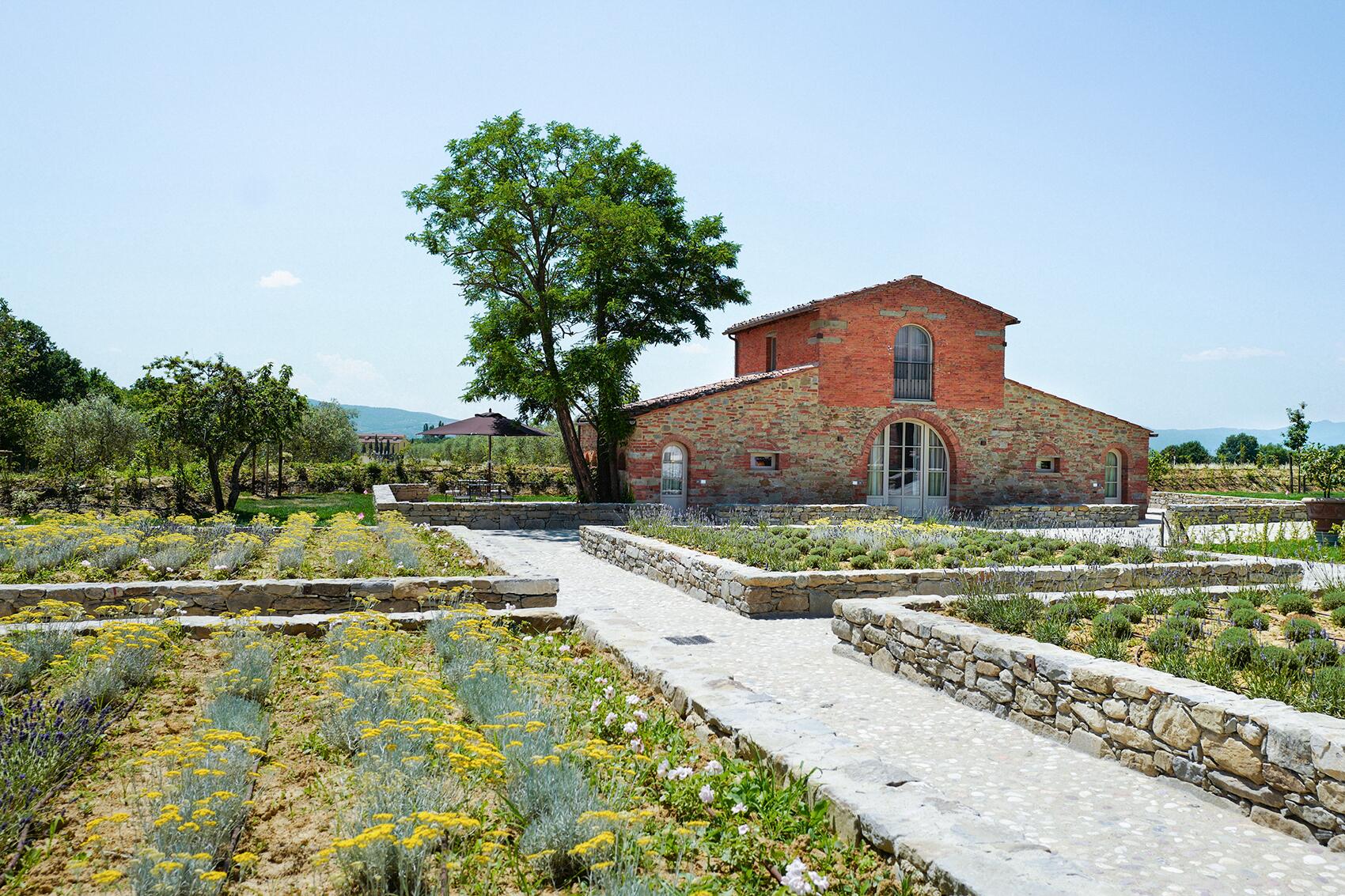Salvatore Ferragamo founded his couture shoe label in 1927, but Ferragamo women have been running the show for decades. Here’s their story.
It’s not often a hotel comprises an actual village, but Il Borro Toscana is anything but typical. A Relais and Chateaux member since 2012, the sprawling property in Arezzo, Italy, is not only home to a dreamy pink villa, but includes luxurious suites strewn about an entire medieval village that still contains its church and a selection of artisan shops where authentic makers continue to hand-produce and display their creations daily. And then there are the 2,700 acres of all-organic agriculture, with more than 200 acres devoted to its prized wine production. With an illustrious history that includes the likes of royalty and the Medici, this top Tuscan utopia is now owned and managed by the Ferragamo family of fashion fame.
While Salvatore’s name may continue to grace the soles of couture shoes around the world today, it’s the women of the Ferragamo family, from wife, Wanda, to granddaughter, Vittoria, with plenty more alongside, who’ve held a surprising amount of control and creative influence as the business branched far beyond shoes in the nearly-100 years since Ferragamo was founded. As the family has opened its own country escape, Viesca Toscana, to discerning guests in recent years, we talked to Vittoria Ferragamo about the origin of “the Ferragamo woman,” the impact of those women on the brands, and how the family’s distinct perspective on living is passed on to guests at both of its exclusive properties.
Recommended Fodor’s Video
Would you start with a quick summary of Il Borro’s illustrious history?
Historically, there are two opinions on what the Borro used to be. Some people say that it used to be a castle and some say it was a fort. This was a very strategic position for the area and it’s been owned by very important families of Europe, like the Medici, for that reason. I first came here when I was eight years old, when my dad would rent the hunting part of the property. We would go around for hours and hours and he was so passionate, telling me about how the land was formed—about the terrain and how the area was once a lake—how different parts of the woods were better for cultivating different things, and also about the medieval village. Now that I’m older and think back, I think he was already considering the future for the borro. The owner at the time was Duke Amedeo d’Aosta of the Italian royal family and, a couple years later in 1993, he decided to sell, so my dad bought the whole property. At that time, it was in a condition that really needed restoring. The main villa was still in the condition it had been left when it was bombed during the war, and there were still debris rocks all across the road. The villa was a huge job and the first thing we did. The medieval village was still inhabited at that time.

People had been continuously living in the village up until the 1990s?
Yes! There was Principessa Giulia Pignatelli, a princess who would do her thing and come and go; then there was a German couple who were musicians; an English couple—she was an English teacher and he kept his glider on the airstrip here, so that was his thing; and then there was the priest of the borro’s church, and his niece and her husband.
What happened to them when your family bought the village?
They stayed! We wanted them to stay. But I think people eventually found it a little uncomfortable to live in a village of this tiny dimension, set away from needs they had, like shops and things, and slowly, slowly they moved away to nearby cities. But they were never forced or asked to leave. We’ve always wanted the borro to be very alive. In fact, we still have one family living there, and the father has been working with us for many years as a carpenter, doing great work. We’re super happy to have his family living in the medieval village. It keeps it alive and keeps it real.
What drew you personally to be involved with Il Borro?
I love nature and all its aspects, and I grew up here. This place is in my heart, so when the opportunity came up I was very excited to come back. I first worked here when I was around 22 and I was seeing to the guests of the main villa, and then I left to work in another hotel because it’s a family requirement that all the grandchildren have work experience in a company that’s not our own. Then I got married and had my two kids, and came back here when my father asked me to manage the horses. And the rest developed from there.
What are your specific roles with Il Borro?
I’m involved in the development of most of our agricultural products, other than oil and wine. We started with a vegetable garden in 2015, the first year we turned fully organic after a three-year transition period, and we deliver vegetable boxes weekly to the cities around the borro—Arezzo, Siena, and Florence. We also serve some restaurants, like our own, and others in Florence, a market in Arezzo, and a few little clients like this who want quality food. After the fresh garden vegetables, we started developing our own products. We have our tomato sauce. We have the cereals from our grains, like wheat, spelt, and buckwheat. We have two types of farro, an ancient grain, and with those we make various things like puffed snacks that we have in the Il Borro suites, rice cakes, pasta, and salads with the seeds themselves.
And I still manage all our activity with the horses. I organize the experiences for our guests, and I manage the new fertilization and breeding program that my husband and I started.
I also manage the wine cellar tours. That’s my only involvement in the wine business because I’m not a wine expert, but I have ideas for guest experiences. And, finally, I manage the shops in the medieval village, making sure the artisan tenants are happy, filling vacancies, and just managing everything that happens with them.
Were you involved in the decision to become a fully organic property?
It wasn’t really a question of making the decision; it was almost automatic. The lifestyle we promote at Il Borro is how we’re used to living as a family. We all eat healthy, we all enjoy sports, we’re all curious and pursue all different kinds of activities. We like to understand what’s going on wherever we are. So, we like you to have a cooking experience in our restaurant where you’ll eat so you learn about how we cook here, what we use, and the history of the village. It’s significant. It gives a different kind of experience with more depth than just enjoying a meal, which is great, but with less connected value. At Il Borro we treasure that value.
The more recently opened Viesca has an even more personal connection to the Ferragamo family, right?
Yes! Basically, this house was the country house of Wanda and Salvatore (and their six kids), so they would go there on holidays, in the summer, and on some weekends. My dad would go there with his sisters and they’d have a lot of fun with the chickens, and running around and playing all their games. It’s a beautiful place surrounded by mountains and filled with big white houses—typical Tuscan casolari—that are not very far from each other, with fields and little roads connecting them. When my grandparents bought it, there was the main villa, where they lived, and farmers were still living in the houses around. But slowly, slowly the farming in the area settled down and even the houses started to fall apart a little bit and, at the same time, my father and his sisters grew and started having their own families and would visit less. Eventually, my grandmother said, “Okay, we’re not going so much to Viesca as a family now,” so she started renting the villa between visits and started slowly repairing and restoring the other houses around to rent them, too. She wasn’t very proactive about bookings; she liked to find guests that would come regularly because she loved getting to know them. That’s how it started.
And when did you, with Il Borro, take over management of Viesca for tourism?
Wanda died in 2018, when she was 97, and we came in around then to take the management of the property. We finished the few houses that hadn’t been completely restored yet and, in the main building, added a small restaurant and some suites. That’s the only building with suites—the rest are all villas. In the villas, we offer various services like cooking and housekeeping, but also yoga, massages, and other activities. It’s a gorgeous area with lots of little villages around, horseback riding, biking, and lots to experience. While Il Borro is a bit more interactive among guests, Viesca is very quiet and private. Like a retreat. People like to have their own villa, each villa has its own swimming pool…you never have to mingle if you don’t want to. But you can go to the restaurant or the main pool to engage, too.
What drew your grandparents to the land at Viesca?
They were living in Fiesole on the outskirts of Florence, but I think they really just wanted the full country experience with more animals and agriculture around.
Were Salvatore and Wanda originally from Florence?
They were originally from the area of Naples, but my grandfather went to the States for the shoe business and came back with the understanding that he wanted to produce them in an artisan way, and the big artisan center was Florence. It was great for handcrafting and he knew he’d find the right people with a certain know-how there. In the United States, he was working in factories, and he didn’t like how every shoe was made exactly the same way for everybody. He studied the anatomy of feet so, for him, the most important thing was that the shoe was made for the individual foot so that they were comfortable.
Did he always know he wanted to be a designer?
He always knew he wanted to make shoes. When he was little, he was one of 14 kids and he came from a family of farmers who weren’t very well off, so they would save their money to educate the kids they thought were smartest so they could become a doctor or lawyer, or something that would bring money back, but my grandfather snuck away to the local shoemaker and started learning to make shoes. His father was so upset, telling him, “Salvatore, no way! That’s a poor job. You’re going to have no future!” But he just loved it and couldn’t help himself. So, one day, two of his sisters were going to receive their First Holy Communion, but they didn’t have suitable shoes and no one in the village had anything they could use. During the night he made shoes for them while everyone was sleeping. His mother was thrilled because she had been so ashamed not to have any shoes for her daughters on this occasion and from then on, they kind of softened up to his shoemaking. And then he started with his own table outside the church on Sundays and would try to sell a few pairs around the village. At 16 he went to the United States and, when he discovered he didn’t like the industrial methods of the factories, he moved to Hollywood to make shoes for the movies because they’re made to measure. He made a lot of boots for all the Westerns, and eventually opened his own shop and all the stars would come to him to get their personal shoes made aside from movies. And Ferragamo still creates custom shoes today for anyone interested.
Had Ferragamo branched out to other fashion while Salvatore was still alive?
No, just shoes, but he would love what it is now. He loved shoes, but his dream was to dress a woman from head to toe. When he passed, he had six kids with my grandmother, who was much younger than him and had never worked. She was left with the family and the business all of the sudden. Their oldest daughter Fiamma, had already learned shoemaking from Salvatore, so she continued to work on the shoes and eventually bags, and slowly, slowly as the children each came of age they came into the company. Wanda remained running the company until nearly the end, but stayed involved even after. In fact, I think it was that she died on a Friday, and on Wednesday she had been at the office. She was always the biggest presence in the company.

What would you say was her greatest impact on the family business?
She was very smart in her diversity and so she always had advice on many things. She did a bit of everything, so she developed bits of wisdom on just about anything. She made albums of letters for her grandchildren where she would write about everything from managing money to how to wash wool clothes. Lists of important people, her personal experiences meeting people—many things. She would write letters to each of us and we would add them to our personal books. She really believed in the idea of the Ferragamo woman and she held the shops and the family to those values. The knowledge that she passed to us in these albums really gave us a feeling of security and comfort. It was a guide.
What are your personal hopes for the future of Il Borro and Viesca?
I hope Viesca will also develop its own production the way Il Borro has, and my goal for Il Borro is to develop our products more and more and to make it a 360-degree kind of place. One example is that we’re increasing our sheep herd to make all our own cheese, and we’re searching for an artisan to work the wool and have a shop in our medieval village. A truly working, sustainable farm. And we have so much restoration to continue across the property, especially as we have acquired more land. And we’ll probably acquire more. My dad is still the owner of Il Borro and he’s a person who never stops, so there will always be more.
Do you think your daughter will be interested in continuing your work in the family business?
I think both of my children will. Pietro is very business-oriented and he likes to see how things work, but he hasn’t shown what area he might be most interested in yet. Beatrice loves animals and wants her own little farm, though, so maybe she’ll want to develop that here. We’ve been thinking for many years to develop a kids club with animals and agriculture so that would be perfect.





